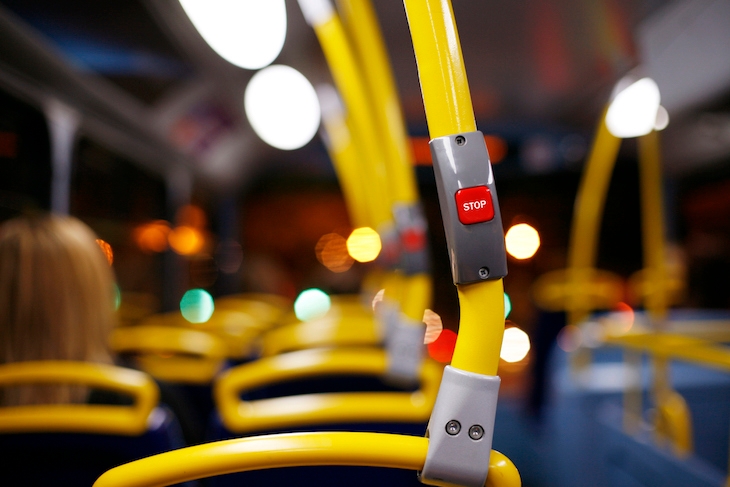When did you last take the bus? If you don’t live in London, probably not for ages. In her two-part series for Radio 4, Mind the Gap, Lynsey Hanley set out to demonstrate just how difficult it is to access public transport outside the capital. In Skelmersdale, billed in the 1960s as a place of opportunity, a new town where everything would work better to make life easy for everyone, rich, middling and poor, no rail connection was built into the plan and now there are very few buses to get around. So bad is it that the council has had to set up a subsidised taxi scheme (euphemistically known as ‘the demand responsive transport system’) so that workers without cars can get to those offices, shops and factories no longer on a bus route. And this at a time when we are supposed to be encouraging consumers to leave the car at home. Skelmersdale is less than half an hour fromLiverpool by car but can take twohours by bus and train, one of the main problems being that the timetables are not integrated.
Only London has a transport authority, linking up bus, underground, overground and suburban railway. Everywhere else the bus networks have been unregulated since government legislation in the mid-1980s, open to commercial competition but intended to have local-authority subsidies as and when necessary. With pressure on budgets, though, bus services have been regarded more and more as inessential and these subsidies have either been drastically reduced or abandoned altogether. The statistics are shocking. In the past decade 134 million miles of bus travel have been lost from outside London (in contrast to the capital where there has been an increase in bus miles travelled of 20 per cent). The outlook is no brighter: of planned transport spending in the future, £4,155 will be spent per head on Londoners, but only £1,600 per head on those who live in the north of England.
Hanley, who doesn’t drive herself, argues that it’s not just inconvenient and isolating for those who happen to live (even in urban conurbations) where there may be only one or at most two buses a day, and no way home after dark apart from taxis. It also means that outside London bus travel is treated as ‘a residual service’ and only for those who have somehow ‘failed’ to organise their lives better. The ‘gap’ she refers to is not between train and platform (or bus and pavement) but between the haves and the have-nots. Buses, she says in her important series, are central to creating a fairer society. Why, then, has the provision of decent services outside London been so low on the agenda?
It’s probably a long time since Jim Kerr of Simple Minds has ever needed to travel by bus. He was Janice Long’s guest for her new series of A Long Walk With… on Radio 2 (their conversation wrestled into shape by the producer Mark Simpson). Long took Kerr back to the Gorbals in Glasgow where he grew up and went to a school (Holyrood comprehensive) that also spawned members of Texas and Travis. His first gig was with his school friends at the Gorbals Railwaymen’s Union Club in 1975, playing Velvet Underground covers wearing clogs and satin bomber jackets. We peeped inside the original ballroom with its sprung floor for dancing and tiny stage. Radio 1 was crucial to that performance, he recalled, because how else would they have been able to learn the songs?
On the waterfront of the Clyde (the inspiration for their most famous song), we discovered, by chance, that Nelson Mandela was a keen salmon fisher. Simple Minds wrote a song about him and when they eventually met, Mandela, knowing the band was from Glasgow (whose city emblem is the salmon, said Kerr), asked them for tips on how to make a catch. That’s why this series works so well. Long has a knack of pulling out odd stories that have nothing to do with the music.
It’s like a blend of Ramblings and Private Passions, which this week on Radio 3 featured one of my favourite radio actors, Adjoa Andoh. Her choice of music was wonderfully eclectic — Rimsky-Korsakov, Vaughan Williams, Peter Grimes, Puccini and Pharoah Sanders — but she was at her most passionate and interesting when she explained why she so much enjoys doing radio drama. You could really hear in her voice how much she loves it. ‘You can’t do funny faces or silly walks, or cry,’ she explained. ‘The voice is all you have to transmit everything.’ Then she gave away the best lesson of all. ‘You’re speaking into the listener’s ear,’ she said. ‘You’re going right into the heart of them. And you’re blending with their imagination.’
Eddie Mair will be much missed from PM as he, too, has that quality of speaking into your ear. The sense that he’s talking directly to you or, when interviewing, asking the questions that you would have asked. Who could replace him? Is there any chance of tempting back Evan Davis from TV? He’s so much better on radio where he makes even the most complex economic issues appear understandable. Bring back Evan.






Comments